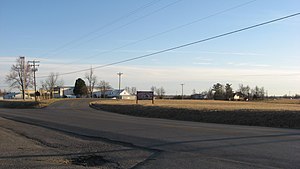| Battle of Sacramento | |||||||
|---|---|---|---|---|---|---|---|
| Part of the American Civil War | |||||||
 Overview of the site of the Battle of Sacramento, located off the western side of Kentucky Routes 81/85 just south of the city of Sacramento, Kentucky | |||||||
| |||||||
| Belligerents | |||||||
|
|
| ||||||
| Commanders and leaders | |||||||
|
|
| ||||||
| Strength | |||||||
| 200-300[1] | 500[1] | ||||||
| Casualties and losses | |||||||
| 2 killed, three wounded.[2] | 10 killed and 13 captured according to Union sources, nearly 100 killed and thirty-five captured according to Confederate sources.[1][2] | ||||||
Battle of Sacramento Battlefield | |
| Location | Junction of Kentucky Routes 81 and 85 in Sacramento |
|---|---|
| Coordinates | 37°25′10″N 87°15′42″W / 37.41944°N 87.26167°W |
| Area | 30 acres (12 ha) |
| Built | 1861 |
| NRHP reference No. | 97000875[3] |
| Added to NRHP | March 24, 1998 |
The Battle of Sacramento was an engagement of the American Civil War that took place in Sacramento, Kentucky on December 28, 1861. Confederate cavalry under Colonel Nathan Bedford Forrest, numbering between 200 and 300, attacked, encircled and defeated a Union force of 500 under Major Eli H. Murray which had been watering south of the town after moving across the bank of the Green River. Though exact casualty information is disputed, with differing accounts from each side, several eyewitnesses attested to the personal courage of Forrest, and the Confederate commander was praised by his superiors for his bravery.
The engagement was one of the earliest of Forrest's career as a commander of the cavalry, and it featured several examples of tactics and traits which would become hallmarks of his military career, including the division of his forces, outflanking and encirclement, concealment, and personally leading cavalry charges. It was also an early battle for Brigadier-General Stovepipe Johnson, who was then a private. The Union force was decisively routed, and the battle became known as "Forrest's First Fight" and is annually re-enacted by local residents.
- ^ a b c Cite error: The named reference
Axelrod85-86was invoked but never defined (see the help page). - ^ a b Cite error: The named reference
DavisonFoxx36-41was invoked but never defined (see the help page). - ^ "National Register Information System". National Register of Historic Places. National Park Service. July 9, 2010.

